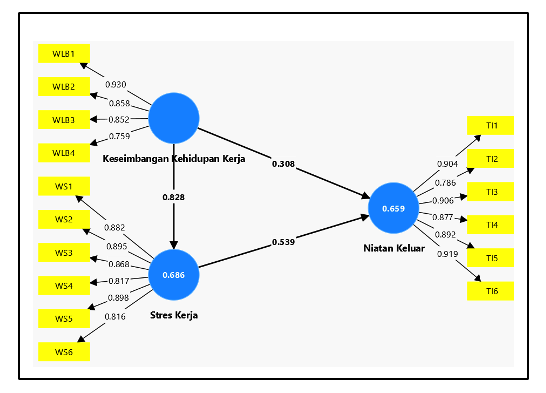Analysis of The Influence of Work-Life Balance and Job Stress on Turnover Intention Among Private Sector Employees of Generation Y in Jakarta
DOI:
https://doi.org/10.38043/jimb.v9i1.5552Keywords:
Work-Life Balance, Work Stress, Turnover IntentionAbstract
This study was conducted to determine the importance of work-life balance and job stress in retaining Generation Y employees. The study had the objective of conducting an investigation on the relationship between work-life balance, job stress, and turnover intention among this demographic. A quantitative approach was used, utilizing Smart PLS version 4 for data analysis. The study involved 100 Generation Y employees as respondents. The findings revealed unexpected results. Contrary to the initial hypothesis, work-life balance had a positive and significant influence on turnover intention, leading to the rejection of H1. Job stress, as expected, showed a positive and significant impact on turnover intention, confirming H2. Surprisingly, work-life balance showed a positive and significant influence on job stress, resulting in the rejection of H3. The results of this study highlighted the complex dynamics between work-life balance, job stress, and turnover intention among Generation Y employees. The study concluded that work-life balance and job stress were important factors that influenced employee retention. The research suggested that management should focus on key aspects such as time allocation, compensation policies, and targeted efforts to effectively address these issues. The findings provided valuable insights for organizations looking to retain the Generation Y workforce in an increasingly competitive labor market.
Downloads
References
Ardi, R., & Anggraini, N. (2023). Predicting turnover intention of indonesian millennials workforce in the manufacturing industry: a PLS-SEM approach. Industrial and Commercial Training, 55(1), 47-61 %@ 0019-7858
Battisti, E., Alfiero, S., & Leonidou, E. (2022). Remote working and digital transformation during the COVID-19 pandemic: Economicfinancial impacts and psychological drivers for employees. Journal of Business Research, 150, 38-50 %@ 0148-2963.
Baughn, R. L. (2023). The Influence of Job Satisfaction Components on Turnover Intention in Commercial Banking Saint Leo University].
Brennan, M., Hennessy, T., Meredith, D., & Dillon, E. (2022). Weather, workload and money: determining and evaluating sources of stress for farmers in Ireland. Journal of agromedicine, 27(2), 132-142 %@ 1059-1924X.
Brough, P., Timms, C., Chan, X. W., Hawkes, A., & Rasmussen, L. (2020). Worklife balance: Definitions, causes, and consequences. Handbook of socioeconomic determinants of occupational health: From macro-level to micro-level evidence, 473-487 %@ 3030314375.
Ekingen, E., Tele, M., Yldz, A., & Yldrm, M. (2023). Mediating effect of work stress in the relationship between fear of COVID-19 and nurses' organizational and professional turnover intentions. Archives of Psychiatric Nursing, 42, 97-105 %@ 0883-9417.
Hair, J. F., Risher, J. J., Sarstedt, M., & Ringle, C. M. (2019). When to use and how to report the results of PLS-SEM. European business review, 31(1), 2-24 %@ 0955-0534X.
Husniati, R., Supriadi, Y. N., & Ali, S. (2024). The Work Life Balance and Job Embeddedness on Turnover Intention: The Role of Organizational Commitment as Intervening. Quality-Access to Success, 25(198 %@ 1582-2559).
Jessica, N., Afifah, N., Daud, I., & Pebrianti, W. (2023). The effect of work environment and work-life balance on job satisfaction: work stress as a mediator. Journal of Economics, Management and Trade, 29(1), 54-65.
Kerdpitak, C., & Jermsittiparsert, K. (2020). The effects of workplace stress, work-life balance on turnover intention: An empirical evidence from pharmaceutical industry in Thailand. Systematic Reviews in Pharmacy, 11(2), 586-594 %@ 0975-8453.
Lazarus, R. S. (2020). Psychological stress in the workplace. In Occupational stress (pp. 3-14). CRC Press.
Lin, W., Wang, H., Gong, L., Lai, G., Zhao, X., Ding, H., & Wang, Y. (2020). Work stress, family stress, and suicide ideation: A cross-sectional survey among working women in Shenzhen, China. Journal of affective disorders, 277, 747-754 %@ 0165-0327.
Manolopoulos, D., Peitzika, E., Mamakou, X. J., & Myloni, B. (2022). Psychological and formal employment contracts, workplace attitudes and employees turnover intentions: Causal and boundary inferences in the hotel industry. Journal of Hospitality and Tourism Management, 51, 289-302 %@ 1447-6770.
Omar, M. K., Aluwi, A. H., Fauzi, M. W. M., & Hairpuddin, N. F. (2020). Work stress, workload, work-life balance, and intention to leave among employees of an insurance company in Malaysia. International Journal of Business, Economics and Law, 21(2), 70-78.
Poulose, S., & Dhal, M. (2020). Role of perceived worklife balance between work overload and career commitment. Journal of managerial psychology, 35(3), 169-183 %@ 0268-3946.
Salama, W., Abdou, A. H., Mohamed, S. A. K., & Shehata, H. S. (2022). Impact of work stress and job burnout on turnover intentions among hotel employees. International Journal of Environmental Research and Public Health, 19(15), 9724 %@ 1660-4601.
Schermerhorn Jr, J. R., & Bachrach, D. G. (2020). Exploring management. John Wiley & Sons.
Serenko, A. (2024). The human capital management perspective on quiet quitting: recommendations for employees, managers, and national policymakers. Journal of Knowledge Management, 28(1), 27-43 %@ 1367-3270.
Shah, S. H. A., Haider, A., Jindong, J., Mumtaz, A., & Rafiq, N. (2022). The impact of job stress and state anger on turnover intention among nurses during COVID-19: the mediating role of emotional exhaustion. Frontiers in Psychology, 12, 810378 %@ 811664-811078.
Surya, I. B. K., & Rihayana, I. G. (2024). The Relationship of Workload, Work Life Balance and Job Stress on Bank Employees. International Research Journal of Economics and Management Studies IRJEMS, 3(4).

Downloads
Published
How to Cite
Issue
Section
License
Copyright (c) 2024 Hanan Nurul, Ahyar Yuniawan

This work is licensed under a Creative Commons Attribution-ShareAlike 4.0 International License.
